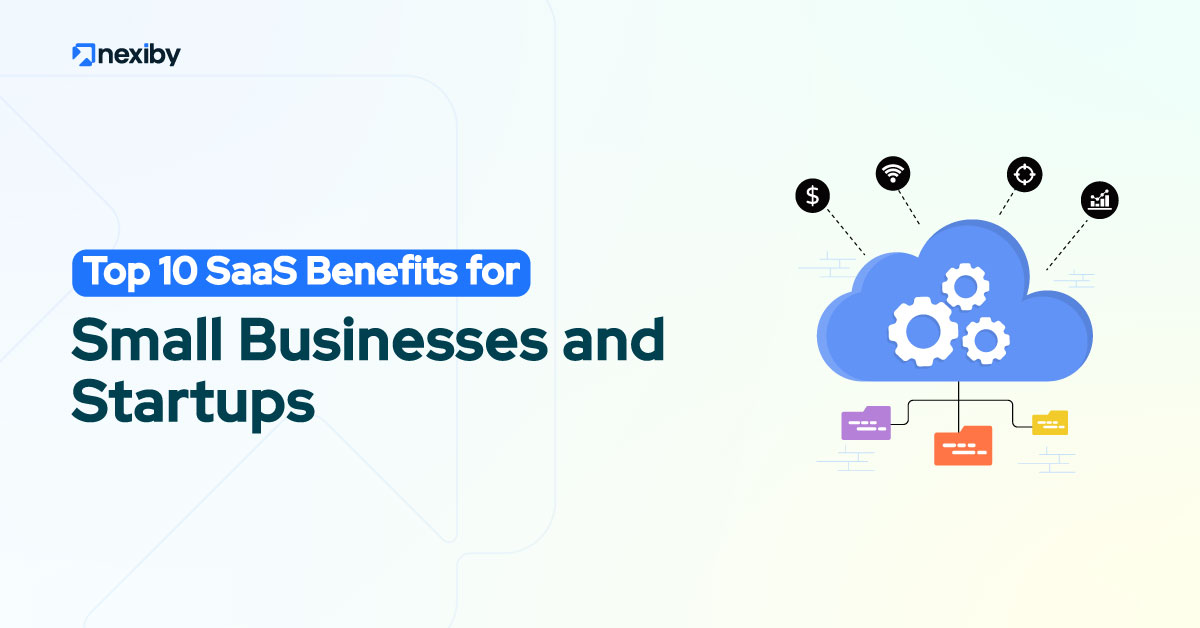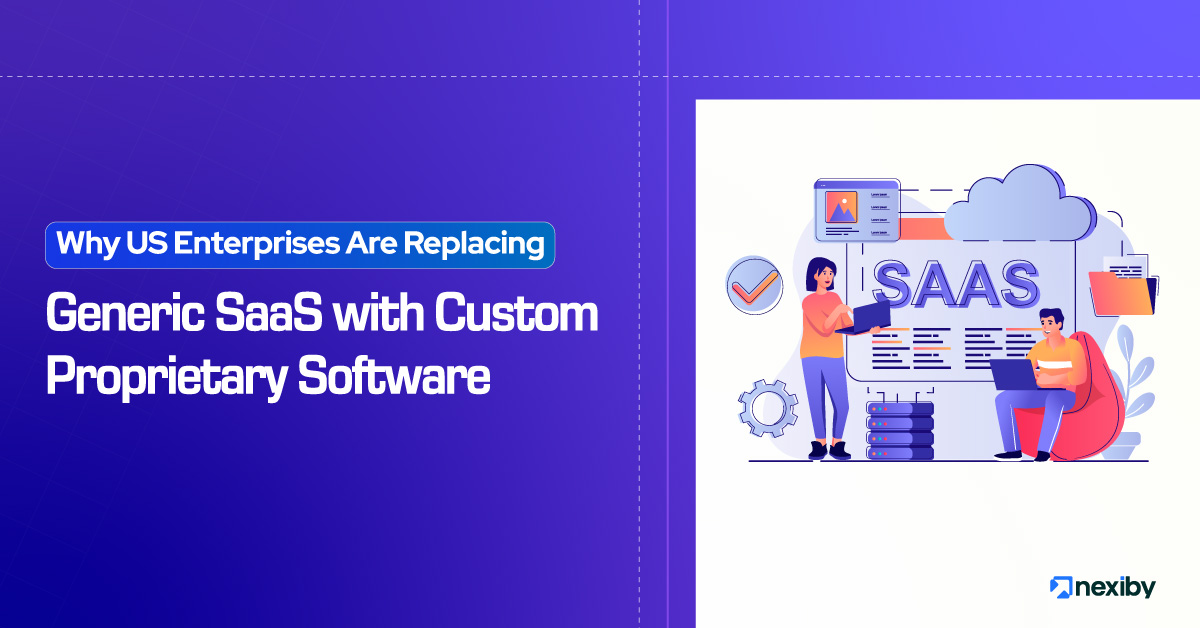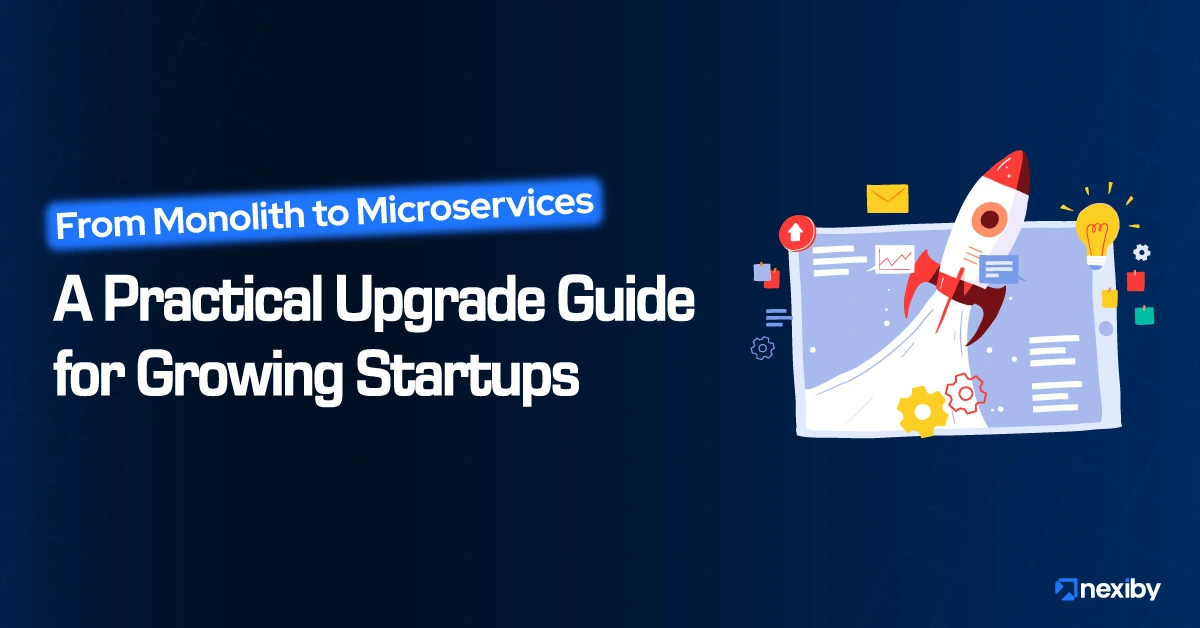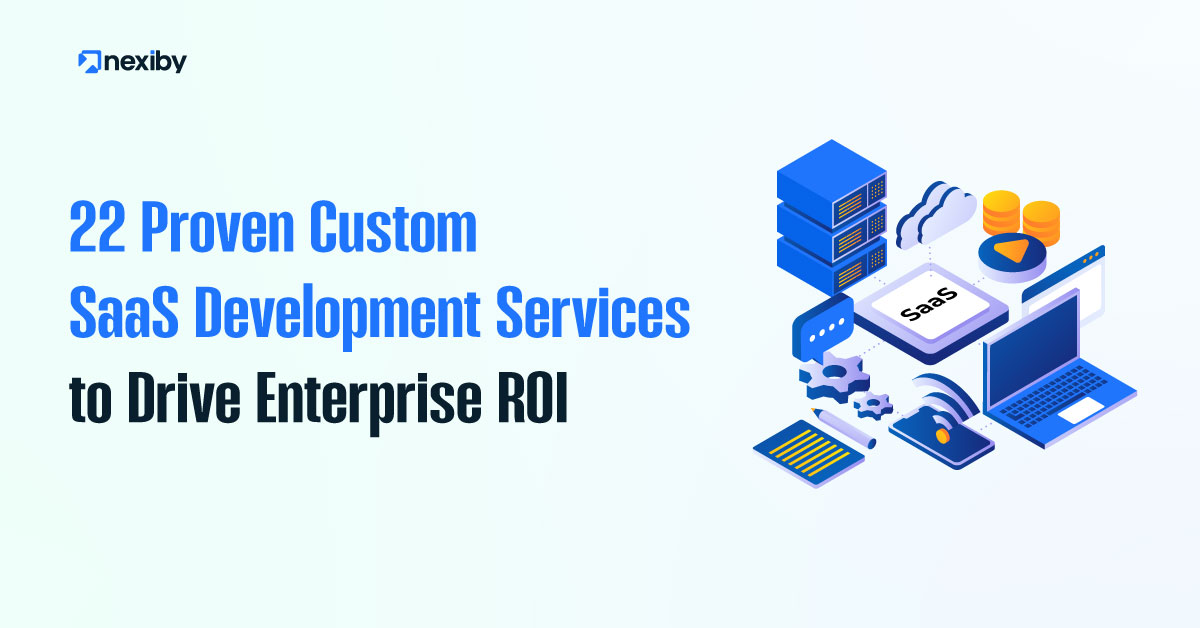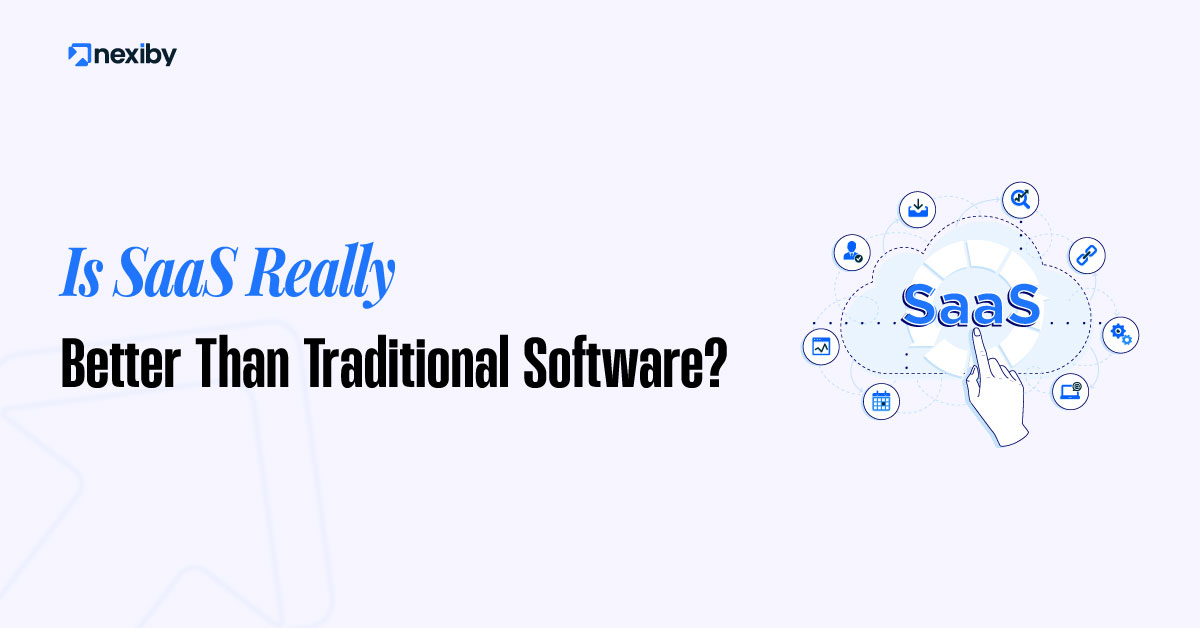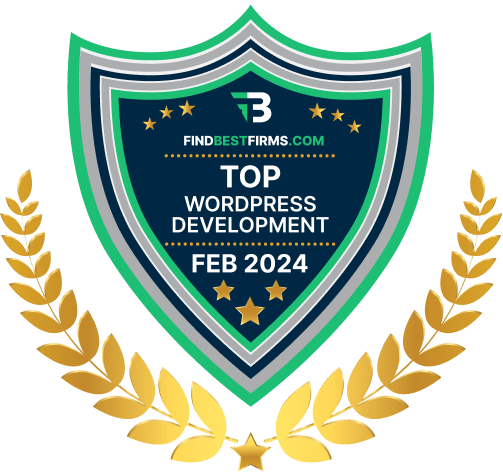Small businesses and startups face big challenges, including limited budgets, small staffs, and intense competition. But here’s the good news: Software as a Service (SaaS) is like a superhero for small businesses, swooping in to save the day with affordable, easy-to-use tools that boost growth without breaking the bank.
Imagine renting powerful software over the internet, paying only for what you need, and skipping the IT headaches. That’s SaaS in a nutshell! In this article, we’ll dive into the top SaaS benefits for small businesses and startups, showing you how these cloud-based tools can help you save money, scale fast, and compete with the big dogs. Ready to grow smarter? Let’s go!
What is SaaS and Why It’s a Game-Changer for Small Businesses?
SaaS is revolutionizing how small businesses operate by offering affordable, cloud-based software that’s easy to use and quick to deploy. Let’s break down what SaaS is and why it’s a must-have for startups today.
What is the SaaS Model for Beginners?
SaaS is like renting an apartment instead of buying a house. You don’t own the software; you use it through a web browser and pay a monthly or yearly fee. No downloads, no CDs, no fuss! Tools like Google Workspace, Slack, and Zoom are all SaaS solutions that deliver powerful features without the need for specialized hardware or IT expertise. For small businesses, this means access to top-notch tools at a fraction of the cost.
Why Small Businesses Need SaaS Now More Than Ever?
Today’s world moves fast. Customers expect instant responses, and remote work is the norm. SaaS benefits for small businesses include flexibility, affordability, and the ability to compete with larger competitors. 63% of small businesses now use cloud-based software (Statista, 2024). SaaS has your back whether you’re managing a team, tracking sales, or building a website.

Slash Costs with Affordable SaaS Benefits for Small Businesses
Saving money is a top priority for startups, and SaaS delivers big-time with budget-friendly pricing and no hidden costs. Here’s how SaaS keeps your wallet happy.
Pay-as-You-Go Pricing Saves Your Budget
Unlike traditional software, which demands hefty upfront payments, SaaS uses a subscription model. You pay a small monthly fee, often starting as low as $10-$20 per user, and only for the features you need. Many platforms, like Mailchimp or Trello, even offer free plans to get you started. This pay-as-you-go approach is one of the biggest benefits of SaaS for small businesses, allowing you to control costs while accessing powerful tools.
No More Expensive Hardware or IT Staff
Traditional software often requires servers, IT staff, and constant maintenance. And SaaS eliminates those costs. The vendor handles everything: servers, updates, and fixes. This means you don’t need a server room or a pricey IT guy. For example, using QuickBooks Online saves you from buying accounting software licenses or hiring a full-time bookkeeper.
Affordable Tools for Cash-Strapped Startups
Startups often run on shoestring budgets, but SaaS makes enterprise-level tools accessible. Platforms like Google Workspace ($6/ 6/month per user) or Slack ($7.25/month per user) offer premium features at prices even solopreneurs can afford. These low-cost solutions let you focus on growing your business instead of worrying about expenses.
Scale Like a Pro with SaaS Flexibility
Growth can be unpredictable, but SaaS makes scaling easy with flexible plans and no long-term commitments. Here’s how SaaS grows with your business.
Grow or Shrink Without the Hassle
One of the top benefits of SaaS for small businesses is scalability. Got a sudden influx of customers? Add more users or upgrade your plan with a click. Facing a slow season? Downgrade or cancel without penalties. This flexibility lets startups adapt to market changes without wasting money or time.
Flexible Plans for Every Business Stage
SaaS providers offer tiered plans to match your business size. Start with a basic plan, then upgrade to premium features as your business grows. For example, HubSpot CRM offers a free plan for beginners and advanced tools for scaling businesses, ensuring you only pay for what you need.
No Long-Term Commitments to Trap You
Unlike traditional software contracts that lock you in for years, most SaaS tools offer month-to-month billing. This freedom lets you test tools, switch providers, or stop using a service without financial risk. It’s like dating apps before committing to a long-term relationship!
Get Up and Running Fast with Easy SaaS Deployment
Time is money, and SaaS gets you started in minutes, not weeks. Discover how quick deployment and user-friendly designs make SaaS a startup’s best friend.
Launch Without an IT Team
SaaS tools are plug-and-play. Sign up, log in, and you’re ready to roll, no IT team required. Tools like Wix for websites or Asana for project management let you start working instantly, saving you the hassle of hiring tech experts or dealing with complex setups.
User-Friendly Designs for Non-Techies
Worried about tech skills? Don’t be! SaaS platforms are designed for everyone, with drag-and-drop interfaces and step-by-step guides. Trello’s colorful boards or Canva’s simple design tools make it easy for anyone to jump in, even if you’re not a tech wizard.
Quick Onboarding for Busy Entrepreneurs
Startups move fast, and SaaS keeps up. Most platforms offer tutorials, live chat support, and community forums to help you learn quickly and efficiently. For example, Shopify’s onboarding wizard guides you through setting up an online store in under an hour. That’s one less thing to stress about!
Boost Team Productivity with SaaS Benefits for Small Businesses
Collaboration and productivity are key to success, and SaaS tools make teamwork a breeze. Here’s how cloud apps supercharge your small business.
Best SaaS Tools for Collaboration
SaaS benefits for small businesses include tools that keep teams connected. Slack lets you chat instantly, Trello organizes tasks visually, and Zoom brings everyone together for video calls. These apps streamline communication, ensuring your team stays on the same page, regardless of their location.
Work From Anywhere with Cloud Access
With SaaS, your office is wherever you are. Cloud-based tools like Google Workspace let you access files, edit documents, and update projects from any device. This real-time access cuts delays and keeps your team moving forward, whether they’re at home or halfway across the globe.
Power Up Remote Teams
Remote work is here to stay, with 58% of small businesses offering flexible work arrangements (Forbes, 2025). SaaS tools like Microsoft 365 or Notion ensure remote teams can collaborate seamlessly, share files securely, and track progress without interruption.
Stay Current with Automatic SaaS Updates
Forget manual updates or downtime, cause SaaS keeps your software fresh and hassle-free. Here’s how automatic updates save time and stress.
Always Use the Latest Features
SaaS platforms update automatically, so you’re always on the latest version. New features, bug fixes, and improvements roll out without you lifting a finger. For example, Mailchimp regularly adds new email templates, keeping your marketing fresh without extra effort.
No Downtime or Manual Fixes
Traditional software updates can result in hours of downtime or require IT assistance. With SaaS, updates occur in the background, often overnight, ensuring your business continues to run smoothly. It’s like getting a car tune-up while you sleep!
Vendor-Managed Systems Save Time
SaaS providers handle servers, security patches, and backups, freeing you to focus on your business. This hands-off approach is a huge SaaS benefit for small businesses, especially those without technical expertise or big budgets.
Keep Data Safe with SaaS Security Features
Security is critical, and SaaS delivers enterprise-grade protection at low costs. Learn how SaaS keeps your data safe and compliant.
Enterprise-Grade Protection on a Budget
SaaS providers invest millions in cybersecurity, offering encryption, multi-factor authentication, and secure servers to protect their users. Small businesses can obtain this protection without incurring a significant expense, making it one of the top SaaS benefits for small businesses with limited budgets.
Automatic Backups and Compliance
Worried about losing data? Most SaaS tools automatically back up your data and comply with regulations such as GDPR or HIPAA. For instance, FreshBooks ensures your financial data is secure and meets industry standards, giving you peace of mind.
Centralized Systems Reduce Risks
SaaS stores data in the cloud, protecting it from physical disasters like fires or theft. Plus, you can control access from a central dashboard, reducing the risk of unauthorized access. It’s like locking your data in a digital vault!
Connect Your Tools with Seamless SaaS Integrations

SaaS tools work together like a dream team, streamlining workflows and centralizing data. Here’s how integrations boost efficiency.
Build a Unified Business Ecosystem
SaaS apps connect effortlessly. Slack integrates with Trello for task updates, Zoom links to Google Calendar for scheduling, and QuickBooks syncs with Shopify for sales tracking. These integrations create a seamless workflow, eliminating the need to juggle multiple tools.
Automate Workflows to Save Time
Automation is a game-changer. Tools like Zapier connect your SaaS applications to automate tasks, such as sending emails, updating CRMs, or posting to social media. It reduces repetitive tasks, allowing you to save time and energy. This lets you focus on what truly matters: growing your business quickly and efficiently.
Centralize Data for Better Control
With SaaS, your data lives in one place. Google Workspace or Microsoft 365 lets you store emails, files, and projects in the cloud, making it easy to track everything. No more digging through folders or emails to find what you need!
Real-World SaaS Success Stories for Small Businesses
Seeing is believing! These real-world examples show how SaaS tools help small businesses thrive in accounting, marketing, and eCommerce.
Accounting Made Easy with QuickBooks and FreshBooks
QuickBooks Online simplifies invoicing, payroll, and tax prep for small businesses. FreshBooks helps freelancers track time and expenses with user-friendly dashboards. Both save hours of manual bookkeeping, letting you focus on growth.
Marketing Smarts with HubSpot and Mailchimp
HubSpot CRM’s free plan tracks leads and manages sales pipelines, perfect for startups. Mailchimp’s email automation and templates help small businesses send professional campaigns without a marketing team. These tools drive sales without breaking the bank.
eCommerce Wins with Shopify and Wix
Shopify makes launching an online store a breeze, with tools for inventory, payments, and shipping. Wix lets startups build stunning websites with no coding skills. Both platforms empower small businesses to sell online and compete globally.
Drive Digital Transformation with SaaS Benefits for Small Businesses
SaaS isn’t just another software; it’s a ticket to modernizing your business. Here’s how it automates tasks, supports mobile work, and wows customers.
Automate Repetitive Tasks
SaaS tools automate time-consuming tasks, such as sending invoices, scheduling posts, or tracking inventory. For example, HubSpot automates email follow-ups, while QuickBooks handles recurring bills. This frees up hours for strategic work.
Run Your Business From Your Phone
Most SaaS tools are mobile-friendly, letting you manage your business on the go. Manage sales on Shopify, respond to Slack messages, or approve budgets in FreshBooks, all from your smartphone. It’s like carrying your office in your pocket!
Wow Customers with Modern Tools
Customers love fast, personalized SaaS Development service. SaaS tools like Zendesk for support or Mailchimp for email campaigns help you deliver instant responses and tailored experiences, making your small business feel like a big player.
Overcome Common SaaS Challenges
SaaS is amazing, but it’s not perfect. Here’s how to tackle common challenges, such as tool overload and team resistance.
Avoid SaaS Sprawl and Tool Overload
Using too many tools can create chaos. Review your SaaS stack every six months to eliminate duplicates and focus on core applications. For example, if Slack and Microsoft Teams overlap, pick one to streamline communication.
Get Your Team Onboard with Training
New tools can intimidate staff. Offer hands-on training, share video tutorials, and hold regular check-ins to build confidence. Many SaaS platforms, such as Trello, offer free guides to make learning enjoyable and accessible.
Choose the Right Tools for Your Needs
Don’t chase shiny new apps. List your business needs, such as invoicing or project management, and then select tools that solve those problems. Test free trials to ensure a tool fits before committing to it.
Why SaaS is a Must for Small Business Success?

The SaaS benefits for small businesses are clear: they save money, boost productivity, and help you grow without the headaches of traditional software. From slashing costs to enabling remote work and keeping data secure, SaaS empowers startups to compete with bigger players. Whether you’re automating tasks with QuickBooks, collaborating on Slack, or selling on Shopify, SaaS tools are your secret weapon for success.
Ready to take your business to the next level? Start exploring SaaS today and watch your growth soar!
FAQs
What are the top SaaS benefits for small businesses?
SaaS saves money, boosts productivity, and offers flexibility, letting small businesses access powerful tools without a large budget.
How does SaaS help startups save money?
SaaS eliminates the need for hardware, IT staff, and upfront software costs, offering affordable subscriptions and free trials.
Are SaaS tools secure for small businesses?
Yes, most SaaS platforms offer encryption, backups, and compliance features that adhere to standards like GDPR, ensuring your data remains safe.
How fast can a startup adopt SaaS tools?
Most SaaS tools are ready in minutes, with user-friendly setups that require no IT expertise. You can be up and running in just a few hours, without needing any technical support or hardware setup.
What are the best SaaS tools for small businesses?
Popular budget-friendly tools include Google Workspace, Slack, QuickBooks, HubSpot CRM, Shopify, and Mailchimp, all known for their affordability and power.

